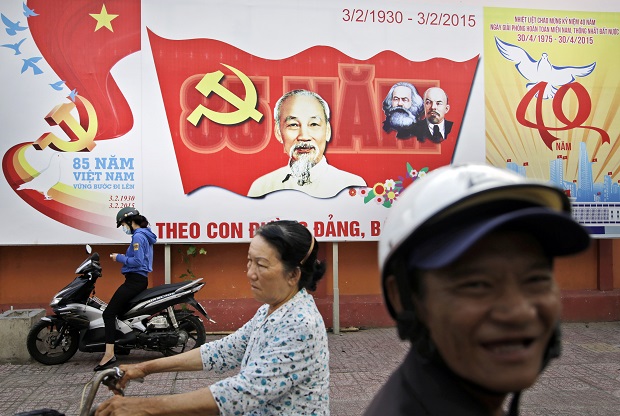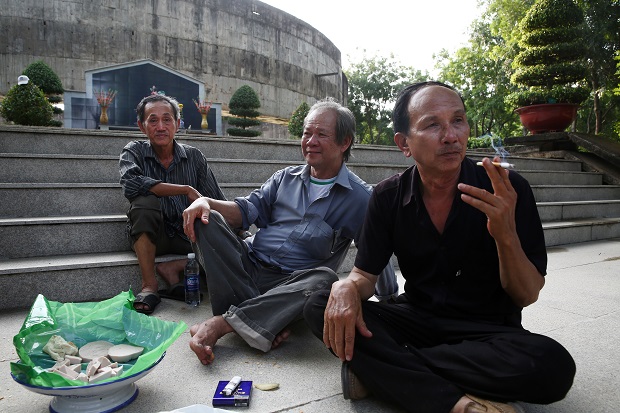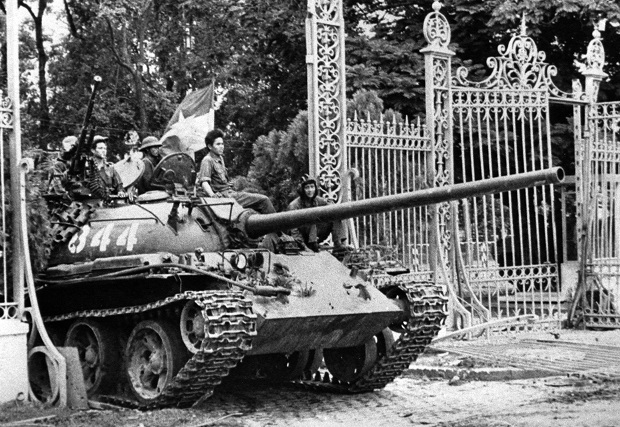Vietnam marks 40 years since fall of Saigon

A Communist Party banner bearing portrait of Vietnamese national hero Ho Chi Minh and communist leaders Karl Marx and Vladimir Lenin is displayed on a street in Ho Chi Minh City, Vietnam, Tuesday, April 28, 2015. The country is set to celebrate the 40th anniversary of the end of the Vietnam War on April 30. AP
HO CHI MINH CITY, Vietnam – Vietnam was set Thursday to mark the 40th anniversary of Saigon’s fall with a huge military parade celebrating the moment their communist forces ended a decades-long conflict and delivered a painful blow to American moral and military prestige.

In this photo taken on April 18, 2015, three former South Vietnam soldiers, from left: Le Van Loi, Le Cao Chai and Ly Van Lang; take a rest after burning incense and placing them at graves at the former South Vietnamese military cemetery, in Binh Duong province, outside of Ho Chi Minh City, Vietnam. Ly Van Lang said they have been visiting the cemetery every weekend for years. The cemetery houses up to 18,000 graves and is a tangled mess of leaves and overgrown weeds, strewn trash, broken headstones and mounds of dark earth with missing or broken markers. In Vietnamese high school textbooks, the war is explained as “resistance against the Americans for national salvation,” and the South Vietnamese military is referred to in some places as the “henchmen army.” There is nothing written about why the south was fighting or what it hoped to achieve. AP
The center of Vietnam’s usually bustling southern business hub was sealed off ahead of the parade marking the moment tanks smashed through the gates of the Presidential Palace in the then southern capital of Saigon — now named Ho Chi Minh City.
“That day my comrades and I were overjoyed as our country was totally liberated and we gained freedom and independence,” veteran Le Cong Bui, 63, who planned to attend the parade, told AFP.
The Northern victors went on to reunite the country under a communist government after a draining war which eviscerated much of Vietnam, killing millions of its people as well as 58,000 American servicemen.

In this April 30, 1975 file photo, a North Vietnamese tank rolls through the gates of the Presidential Palace in Saigon, signifying the fall of South Vietnam. The war ended on April 30, 1975, with the fall of Saigon, now known as Ho Chi Minh City, to communist troops from the north. AP
Division haunts country
Article continues after this advertisementThe conflict was also bitterly divisive in the US and still haunts the country.
Article continues after this advertisementAs the first Cold War conflict to be covered extensively covered by the western press — and the first to be lost by a modern superpower that thought itself unbeatable — it remains seared into the public imagination, most often as a tragic waste of blood and treasure.
The winning side has also struggled with the meaning of the war as the nominally communist government deepens its embrace of market capitalism.
For decades, Hanoi has celebrated its military victory as a means to legitimise its ongoing authoritarian rule.
The communists’ 1975 victory was a moment of global historic importance, said Vietnam expert Jonathan London, at City University of Hong Kong.
Gone a long way
With the parade the party is trying to both commemorate victory and “erase any possibility that its achievements over the last 40 years have fallen short of the mark,” he said.
Vietnam has come a long way since the end of the war, and especially over the last 20 years since the adoption of market reforms, London added, but wartime anniversaries still play a key role for the older generation.
Yet increasingly, the public is indifferent or even hostile to such shows of official patriotism.
“I don’t care about this parade — it’s bad for business,” said Nguyen Thi Dieu, 25, a vendor who sells cold water and snacks in the city centre told AFP.
“The parade is just for the TV cameras and for the top leaders, not for people like me.”
Dissent not tolerated
Vietnam remains a one-party state where dissent is not tolerated and all media is state-controlled.
Local press has run fawning stories ahead of the anniversary, heavy on wartime heroism.
But online, where many citizens now prefer to read their news, criticism of the anniversary is more widespread.
“Let the past go, it’s been 40 years,” wrote businessman Tran Minh Chien on his Facebook page in a typical comment, urging the government not to waste time and money on a major military parade.